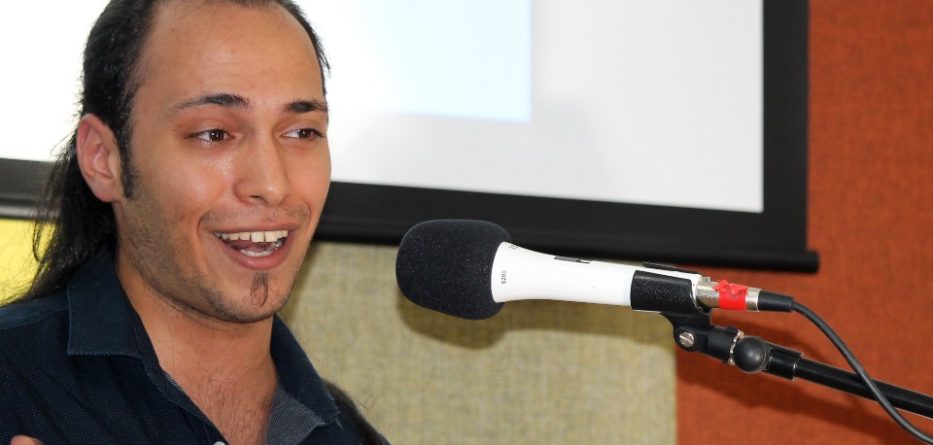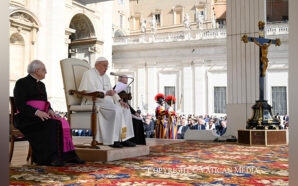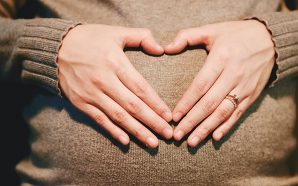A young Iraqi’s new life in Australia
The night was lit by anti-aircraft fire and explosions over Baghdad.
The bombings of the second Gulf War forced millions of Iraqis to abandon their country.
Among them was nine-year-old Kane Alkoraghooli.
It was 2003. For a decade, his family lived between Lebanon, Syria and Iraq. Today this dynamic and joyful youth lives in Australia, where he has been granted refugee status.
On the island, he was able to rebuild his life, resume his studies and his work with migrants.
“For us to dream means to be flexible, so that you can adapt to whatever life offers you”, he told L’Osservatore Romano. “We feel like we have no control over our life. I imagine that it might seem negative to many people, but I think it is also an indicator of resilience”.
They are precious words that help us reflect on this World Day of Refugees celebrated on 20 June.
Kane arrived in Australia with his family in 2015, thanks to a humanitarian refugee visa granted through the Australian Embassy in Lebanon.
While waiting for the approval of his request for asylum, this young man had a variety of jobs and had to abandon his university studies more than once due to the constant wars that forced him to leave the places in which he lived.
For this reason, he lived about a third of his life in Iraq and a third in Syria. “When they ask me where I’m from I answer that my nationality is of both countries, but now I am also part Australian”.’
Kane has lived in Sydney for six years. “As soon as I arrived, I looked for a job to support myself and my family. I then started studying to build a professional career for myself, but I gave up my courses to focus on work”.
Most of his effort was and is aimed at supporting the refugees and migrants who arrive in Australia. An activity that blossomed in Syria and grew stronger over time, also thanks to his volunteer work at the Red Cross and with The Sydney Alliance, a network of social, educational, but especially religious organisations.
Among these is the Diocese of Parramatta, which Kane works with. It is located in a multi-ethnic suburb of Sydney, home to migrants from South Sudan, Iraq, Syria, Afghanistan and Myanmar.
Throughout these years, the young Iraqi has never lost the desire to complete his studies which have so often been interrupted. So, after a while, he decided: “I chose to study law and economics at Western Sydney University because I understand that this mixture of knowledge may be useful in various arenas”.
Kane believes he is lucky. “What helped me most to rebuild my life was support from the government, the community and various humanitarian organisations. Unfortunately, this support is not available to everyone in Australia”. He is referring to the national immigration management plan. In fact, the programme recognises two categories of people: on the one hand asylum seekers who receive a temporary entry visa; on the other hand, refugees who obtain a permanent visa. The difference is unfathomable.
The young Iraqi and his family were granted the right to asylum and, therefore, enjoy numerous services. “When I arrived”, he explained, “a local organisation supported me for six months and I have the right to housing assistance, to basic necessities and food, to social and employment services and an allowance to study in public institutions”.
According to UNHCR estimates, Australia provides some 57 thousand refugees access to these services and allows them to obtain citizenship through a process of integration and social inclusion. Asylum seekers, however, do not have such rights. Some of them, 1,497 people, live in detention centres.
“The average period of stay is 646 days, and it has never been this high”, says Bishop Vincent Long Van Nguyen of Parramatta, who is also a former refugee from Vietnam.
Some migrants have taken their own lives in those camps, various times drawing the attention of the Australian Episcopate and of the international community, who have asked the government to guarantee respect for universal rights and human dignity.
When Kane is asked if he is happy to live in Australia, he replies with a quote from Egyptian intellectual Naguib Mahfouz: “Home is not where you were born, home is where all your attempts to escape cease”.
“For me, home is the place where you can finally sit down and settle in. It is your heart”, he says.
The young man loves Australia and adores living in Sydney. “One of my favourite places is Maroubra Beach: I go there two or three times a week to admire a sunrise or sunset”.
Kane says he feels a deep bond with Australia but does not hide the fact that a part of him would like to return to Iraq. “If I ever have economic stability, I would like to return to the Middle East or Africa, where I think I could contribute most to helping poor people and refugees”.
He says he has a deep spirituality, but is not a believer. “For me, religion offers a sort of chance to find meaning in life”.
From the sacred texts and writings of the intellectuals of the three great monotheisms, he says he has found deep wisdom that has always fascinated him.
“My family is not Christian, but we had a Bible at home. As a child, I read it and I found many stories that I believe influence human values. Likewise, I have read Tolstoy, Rabbi Lionel Blue and other religious texts”.
These works, Kane emphasises, have played a significant role in shaping his world view.
“Part of the work that I do today with migrants is based on relationships,” he says. “The entire organisation focuses on the search for what truly unites people, communities, values, histories and common relationships”.
Love is what binds our existence.
Reproduced with permission from L’Osservatore Romano and Giordano Contu.
You can find the video series My Journey, Our Journey featuring Kane and Bishop Vincent on thewell.org.au
This article highlights a story from the “Diocesan Journey… Walking with Refugees and People Seeking Protection”. Click here to learn more about this initiative and to follow our 14-weeks campaign from Refugee Week to World Day of Migrants and Refugees.








